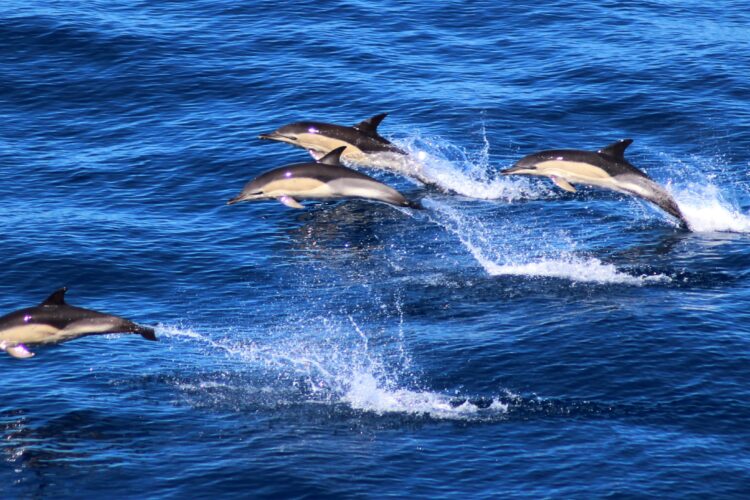Common dolphin sightings increase on Portsmouth-Caen and Poole-Cherbourg ferry routes
-
 Common dolphins seen from ship - image ORCA
Common dolphins seen from ship - image ORCA
-
 Observation-based research from ship bridge - image ORCA
Observation-based research from ship bridge - image ORCA
Passengers on ferry services departing Portsmouth and Poole for France can expect to spot more common dolphins. That’s one of the findings in whale and dolphin charity ORCA’s The State of Cetacean Report 2024. Scientists say reasons are not fully understood but that the rise could be linked to climate change and associated movement in marine ecosystems.
Brittany Ferries has partnered with ORCA for the last 15 years. Ocean conservationists and marine scientists have been travelling with the company on routes connecting the UK with France and Spain, and on services operating between France and Ireland. Their work includes enthusing and educating passengers, and feeding data on whale and dolphin sightings to governments as part of the EU Habitats Directive.
Eight Ocean Conservationists worked on Brittany Ferries’ ships last year, the most ever. They travelled more than 106,000 km on board Pont-Aven, Galicia, Salamanca and Santoña and chalked-up 15,493 sightings of 24,926 animals (some in multiple pods). Thirteen separate cetacean species were observed throughout the year.
Fin whale hotspot
Through repeated observations, ORCA has identified a hotspot in the southern Bay of Biscay for fin whale spotting. Canyons are thought to concentrate prey species such as northern krill and anchovy and it is estimated that more than 10,000 of the planet’s second largest creature aggregate over the Abyssal Plain during the summer.
It’s a fine dining spot for fin whales, but also also a mouth-watering opportunity for cetacean spotters travelling from the UK to Spain by ferry. With a 360 degree view of the sea, and guided by ORCA spotters, they have the perfect opportunity to see this beautiful, endangered species.
“Our partnership with ORCA is something we value incredibly highly,” said Julian Patchett partnership manager Brittany Ferries. “On the one hand there is the wonderful experience passengers have seeing magnificent creatures at sea, and learning more about them on their voyage to France or Spain. On the other is the vital scientific work that underpins our partnership, helping protect whale and dolphin populations for future generations.
“It was through our partnership with Brittany Ferries that ORCA came into being and laid the foundations for us to become the global organisation that we are now,” added Lucy Babey, director of programmes ORCA. ”Being able to open up the oceans for ferry passengers, and show them the wonders of our marine wildlife remains a key part of what we do. For many people, spotting their first whale or dolphin in its natural environment is something that stays with them forever and this partnership makes that magic happen.”
Ship strike prevention
For passengers, spotting a whale or dolphin (or giant sunfish or beautiful basking shark) is always a joyful experience. But for ORCA, the opportunity to travel repeatedly on the same seaborne routes presents the perfect opportunity for serious scientific study.
ORCA’s ongoing work on preventing so-called ‘ship strike’ is one such example. Observation-based research on whale behaviour in proximity to large vessels took place on Brittany Ferries ship Galicia in 2023, with a dedicated scientist stationed on the bridge.
The research is far from complete. But already there is some evidence to suggest that different whale species behave differently when faced with a large vessel. Fin whales, for example, seem to be less attentive than other species. Around ten “near-miss” events occurred with fin whales during 2023 bridge observations and the animals did not react to the ship’s presence. This was in direct contrast with other species observed like Cuvier’s beaked whales.
It is hoped that following further research, findings could have a direct impact on reducing collisions between whale and ship on the global stage. For example, deck crews travelling through whale and dolphin hotspots could be advised of the most appropriate course of action to take if ship strike is likely or imminent, depending perhaps on the behaviour patterns of the species encountered.
Ends
About ORCA
ORCA is one of the UK’s leading marine conservation charities with a mission to give everyone who cares about whales and dolphins an active role in safeguarding their future. They have coordinated a national network of volunteer citizen scientists since they were founded in 2001, using ferries and cruise ships as platforms of opportunity to collect critical data about whales, dolphins and porpoises. ORCA’s research is used by governments to inform UK & European marine conservation policy and they are a key voice in the UK marine conservation sector. To find out more visit www.orca.org.uk
About Brittany Ferries
Brittany Ferries was conceived in 1972, starting life as a freight-only ferry-service on 2nd January the following year. The first vessel (Kerisnel) linked Roscoff in Brittany with Plymouth in the south west of England and carried a cargo of cauliflowers and cognac. Since then the company has progressively launched, then strengthened its shipping routes. In more than 50 years of service, millions of passengers and businesses have travelled by sea across the so-called Atlantic Arc (France, UK, Spain and Ireland). They rely on the links forged by more than five decades of experience. In addition to cutting congestion and emissions on busy roads, Brittany Ferries’ motorways-of the sea have helped enrich local communities, creating jobs, nurturing international tourism and boosting cross-border trade.
 News
News